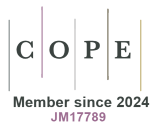Downloads
How to Cite
Jommi, MSc, C., & Bertolani, Phd, A. (2018). Patients’ Associations and HTA for medicines: actual and future role in Italy. Global and Regional Health Technology Assessment, 5(1). https://doi.org/10.33393/grhta.2018.445
Issue
Section
Original Research Articles
License
Statistics
- Abstract views - 809 times
- PDF downloads - 554 times
Sign up
Browse
banners150
Most popular articles in the last 30 days
-
259
-
201
-
163
-
146
-
118









